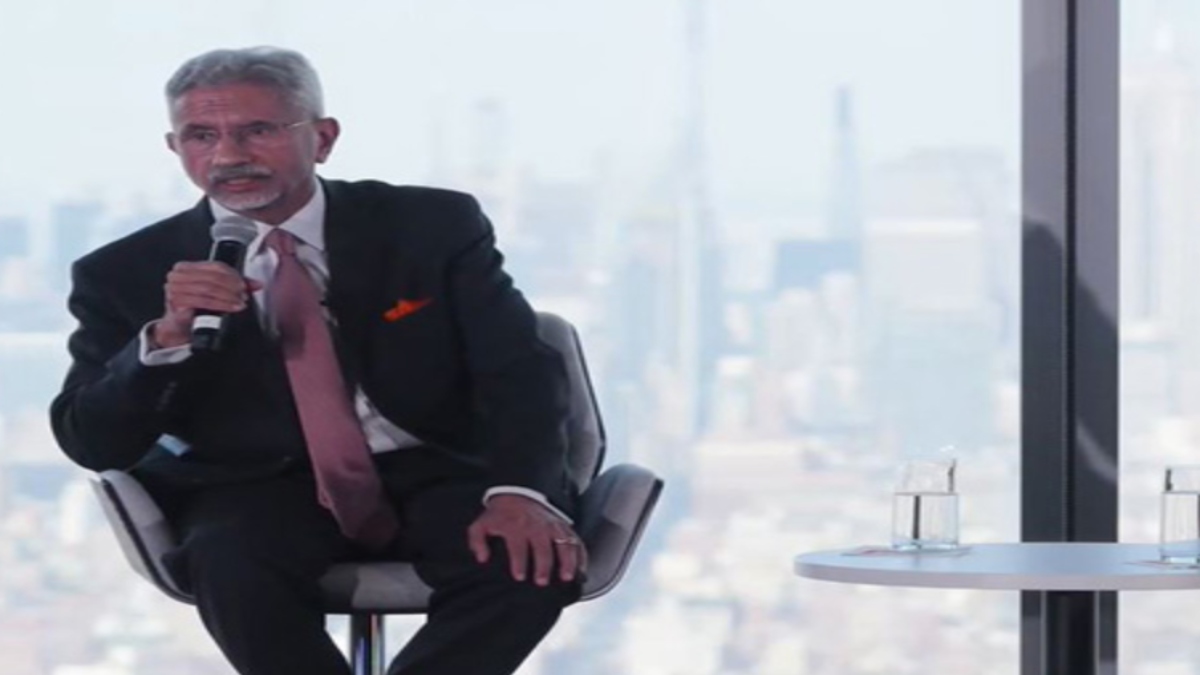External Affairs Minister S Jaishankar on Tuesday called for establishing an “equilibrium” in India’s relationship with China that safeguards New Delhi’s interests, while also emphasising the need to deepen strategic convergence with the United States amid rising tensions in the Indo-Pacific.
Speaking during a fireside chat with Newsweek, Jaishankar discussed India’s strategic positioning in the Indo-Pacific amid rising tensions between the United States and China.
He noted that the evolving dynamic between Washington and Beijing has taken on a more sharply competitive tone, with significant implications for countries like India.
“There are certain realities of the landscape. One of them is that the relationship between the US and China is not what it used to be. That is, it has acquired a much sharper competitive edge… There’ll be an element of tactics to it. There’s a larger strategic view that they have of each other that we would look, quite honestly, to see in what way our interests are furthered in this landscape,” ANI quoted Jaishankar as saying.
Jaishankar emphasised the importance of establishing a balanced India-China relationship that safeguards India’s interests, while simultaneously deepening areas of convergence with the United States to maximise strategic and economic gains.
“In many ways we have very strong convergences with the United States. At the same time, we are China’s largest neighbour… We want stable relations with China. They’re a very large trade partner as well, a very imbalanced trade, but still a very large trade account. For how to steady the China relationship, create an equilibrium that is fair to us. At the same time, how do you work the convergences with the United States and get the most out of it that’s frankly the way we would approach it,” Jaishankar was quoted as saying.
The India-China relationship was expected to stabilise after both sides reached an agreement in October last year on patrolling arrangements in the Depsang Plains and Demchok, two key friction points along the Line of Actual Control (LAC).
Impact Shorts
More ShortsThis development followed earlier disengagement at other flashpoints in eastern Ladakh after a series of diplomatic and military-level talks.
Shifting focus to the Indo-Pacific, Jaishankar highlighted the strategic importance of the Quad alliance, comprising India, the US, Japan, and Australia, in promoting regional stability and prosperity.
He noted that the first international engagement of the Trump 2.0 administration was a Quad meeting, underscoring the group’s growing relevance in the evolving Indo-Pacific landscape.
Outlining Quad’s objectives, Jaishankar declared the Quad as an equal partnership among four nations positioned at the “four corners of the Indo-Pacific”, working collaboratively to foster stability and prosperity in region and that the grouping had worked on several issues unrelated to the group’s primary concern over China’s dominance in the region.
“The quad is a very interesting mechanism, partly because it was an international commitment which resurfaced during President Trump’s first administration… It was a new commitment made by the United States under President Trump. There’s been a lot of progress since 2017 when it was restarted and again, it was interesting that the first international meeting of the Trump 2.0 administration started with a quad meeting,” the EAM said.
He outlined the QUAD’s objectives, including maritime safety and security, connectivity, technology, pandemic preparedness, and education, with a focus on creating a stable and prosperous Indo-Pacific region.
“There are a lot of issues that we need to discuss in the Indo-Pacific. Issues about maritime safety and security, issues about connectivity, issues of technology, issues of pandemic preparedness, and issues of education. You have four countries in a way - four corners of the Indo-Pacific - who have decided that they have a shared interest in creating a stable more prosperous Indo Pacific and are willing to work on a very practical basis. It’s a kind of equal arrangement where everybody pays their fair share as you go along,” he added.
The Quad is a diplomatic partnership among Australia, India, Japan, and the US, committed to supporting an open, stable, and prosperous Indo-Pacific region that is inclusive and resilient. The Quad’s origins date back to the collaboration in response to the December 2004 Indian Ocean tsunami.
With inputs from agencies
)